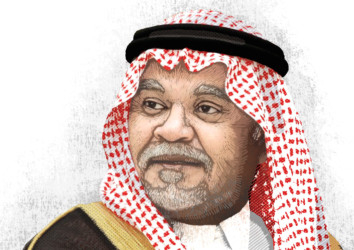
Press TV, the Iranian television network, salivated last week’s Saudi royal decree that replaced Prince Bandar Bin Sultan with his deputy as “spy chief”. Mainstream sources like the restrained BBC were equally moved by a routine development that saw the prince “removed from his post at his own request,” while The Guardian perceived it as the “end of an era”.
Some wrote Prince Bandar’s obituary, recounting how the “peasant prince” worked his way up to become head of intelligence in 2012, while David Hearst, the ‘Middle East Eye’ editor at the Huffington Post, opined that the “final nail in Prince Bandar Bin Sultan’s coffin” apparently came when the Minister of Interior Prince Mohammad bin Nayef “obtained” from King Abdullah Bin Abdul Aziz “a written mandate to keep the file”.
Regrettably, even serious commentators engaged in hysterical anti-Saudi campaigns, skirting fundamentals while focusing on peripheral matters. What was one to make of these hasty assessments that tied the policies of the Kingdom to a single individual no matter how influential?
According to the official royal decree, the 65-year-old prince was “exempted ... from his position at his own request,” although the communiqué relieved him from his duties as head of the Istikhbarat Al Amah (General Intelligence Presidency), a position he first occupied on July 19, 2012 when he replaced Prince Muqrin Bin Abdul Aziz, the heir to the heir apparent. In other words, Prince Bandar retained his National Security Adviser position, to which the monarch appointed him in October 2005. As such, he is still the key individual who has assisted the monarch to set the Kingdom’s overall policies, which have not changed.
It now seems clear that the partial release was primarily for health reasons, which appear to be far more serious than generally assumed, and that have taken a toll on Prince Bandar. Although impossible to verify from open sources, Prince Bandar was most likely confronted by a far greater medical condition than heretofore acknowledged, and suffers from the sequels of his back problems that started in 1977 after he crash-landed his air force jet. Since then, he has undergone four separate surgeries, and may actually have other medical problems that are not discussed in public for privacy reasons.
Still, this has not prevented experts to advance various theories, some of which border on the comical. For a few, sinister plots were under way, including an effort by Mohammad Bin Nayef, Mit‘ab Bin Abdullah or even Muqrin Bin Abdul Aziz — perhaps with the full approval and support of the monarch and the heir apparent — to strip Prince Bandar of the Iran and Syria portfolios as if these files were in his exclusive hands.
One widely discussed pretentious theory has the diabolical Prince Mohammad Bin Nayef apparently persuading the ruler to move along those lines not only because, allegedly, the Iran and Syria policies produced “disasters,” but also to placate Washington. The logic of this conjecture supposedly rested on Bandar’s failure to secure a Western “bombing” of Bashar Al Assad after the August 2013 Al Ghouta chemical attacks, especially after Prince Bandar repeatedly assured his monarch that Obama and his French counterpart François Hollande were poised to act. How anyone could actually know what assurances the nephew gave his uncle remains a mystery although many pretended to have impeccable access when they did not.
In addition to being far-fetched, such commentaries neglected to note that the king set the policies of the Kingdom after various consultations with senior royals and that every official — without any exceptions — implemented the king’s final decisions. In fact, there were no policy changes towards Iran, Syria, Turkey, Egypt, Qatar or any number of countries because Riyadh pursued steady objectives whose fundamentals were stable and not subject to fanciful alterations.
Saudi Arabia perceived the birth and rise of extremism throughout the region as an existential threat and was determined to oppose its spread at all costs. It adopted specific goals to meet this threat from all sources and wished to persuade its GCC neighbours that meaningful contacts with Tehran, Ankara, Cairo, and Sana’a, among others, could not result in Saudi Arabia abdicating its responsibilities. Lest one believe in fairy tales, Iran’s regional hegemonic policies, best articulated in its decades-old nuclear programme that was likely to result in an unabashed military potential, could not be perceived as a peaceful step.
Indeed, calmer heads in Riyadh recognised this threat for what it was, with inherently dangerous repercussions in Syria and Egypt as well as throughout the Arabian Peninsula.
It was with such objectives in mind that King Abdullah appointed Yousuf Al Idrisi, Prince Bandar’s deputy and a highly respected non-royal, to lead the Istikhbarat. Given that this position was usually reserved for a royal, the king’s pick of Al Idrissi revealed two specific points: (1) that there would be no policy changes on vital concerns, and (2) that the King fully trusted his appointee. Everything else is whimsical gossip.
Dr Joseph A. Kechichian is the author of Legal and Political Reforms in Saudi Arabia (London: Routledge, 2013).










